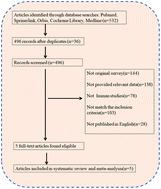当前位置:
X-MOL 学术
›
Toxicol. Res.
›
论文详情
Our official English website, www.x-mol.net, welcomes your
feedback! (Note: you will need to create a separate account there.)
Effects of moderate red wine on cardiovascular risk factors in diabetics: a systematic review and meta-analysis of randomized controlled trials.
Toxicology Research ( IF 2.2 ) Pub Date : 2019-11-12 , DOI: 10.1039/c9tx00227h Saavia Alice Naame 1 , Decheng Li 1 , Ruixue Huang 1
Toxicology Research ( IF 2.2 ) Pub Date : 2019-11-12 , DOI: 10.1039/c9tx00227h Saavia Alice Naame 1 , Decheng Li 1 , Ruixue Huang 1
Affiliation

|
Background: Diabetes mellitus is of major public health concerns; its incidence is continuously increasing. Diabetes mellitus is associated with a high risk of cardiovascular complications such as hypertension. Red wine has been reported to reduce cardiovascular risk factors. We quantified the effects of red wine on cardiovascular factors. Methods: We retrieved English-language articles published from January 1990 to April 2019. Cardiovascular risk factors were compared using means with 95% confidence intervals (95% CIs). Results: We identified five eligible randomized controlled trials. Diabetic patients who drank red wine exhibited significantly reduced systolic blood pressure (BP) (mean difference [MD] −1.33, 95% CI −1.81, −0.85) and diastolic BP (MD −1.31, 95% CI −1.80, −0.83) than those who did not. Compared to the observations for diabetics who did not drink red wine, the high-density lipoprotein (HDL) level was significantly higher in red wine drinkers (MD −0.24, 95% CI −0.39, −0.09). However, red wine had no effect on the body mass index (BMI) (MD −0.27, 95% CI −1.80, 1.25), the total cholesterol level (MD 0.13, 95% CI −0.17, 0.44), or the low-density lipoprotein (LDL) level (MD 0.08, 95% CI −0.21, 0.37). Conclusions: Red wine consumption significantly lowered BP and increased the HDL level in diabetics. Red wine had no significant effect on BMI or cholesterol and LDL levels. Given the heterogeneity of the studied populations and the lack of standardization and completeness across the published studies, caution is required while interpreting these findings.
中文翻译:

适量红酒对糖尿病患者心血管危险因素的影响:随机对照试验的系统评价和荟萃分析。
背景:糖尿病是主要的公共卫生问题;其发病率不断增加。糖尿病与高血压等心血管并发症的高风险有关。据报道,红酒可以减少心血管危险因素。我们量化了红酒对心血管因素的影响。方法:我们检索了 1990 年 1 月至 2019 年 4 月发表的英文文章。使用具有 95% 置信区间 (95% CI) 的方法比较心血管危险因素。结果:我们确定了五项合格的随机对照试验。喝红酒的糖尿病患者的收缩压(BP)(平均差[MD] -1.33,95% CI -1.81,-0.85)和舒张压(MD -1.31,95% CI -1.80,-0.83)显着降低比那些没有的人。与不喝红酒的糖尿病患者的观察结果相比,喝红酒的糖尿病患者的高密度脂蛋白(HDL)水平显着较高(MD -0.24,95% CI -0.39,-0.09)。然而,红酒对体重指数(BMI)(MD -0.27,95% CI -1.80,1.25)、总胆固醇水平(MD 0.13,95% CI -0.17,0.44)或低胆固醇水平没有影响。密度脂蛋白(LDL)水平(MD 0.08,95% CI -0.21,0.37)。结论:饮用红酒可显着降低糖尿病患者的血压并增加高密度脂蛋白水平。红酒对体重指数或胆固醇和低密度脂蛋白水平没有显着影响。鉴于研究人群的异质性以及已发表研究缺乏标准化和完整性,在解释这些发现时需要谨慎。
更新日期:2019-11-12
中文翻译:

适量红酒对糖尿病患者心血管危险因素的影响:随机对照试验的系统评价和荟萃分析。
背景:糖尿病是主要的公共卫生问题;其发病率不断增加。糖尿病与高血压等心血管并发症的高风险有关。据报道,红酒可以减少心血管危险因素。我们量化了红酒对心血管因素的影响。方法:我们检索了 1990 年 1 月至 2019 年 4 月发表的英文文章。使用具有 95% 置信区间 (95% CI) 的方法比较心血管危险因素。结果:我们确定了五项合格的随机对照试验。喝红酒的糖尿病患者的收缩压(BP)(平均差[MD] -1.33,95% CI -1.81,-0.85)和舒张压(MD -1.31,95% CI -1.80,-0.83)显着降低比那些没有的人。与不喝红酒的糖尿病患者的观察结果相比,喝红酒的糖尿病患者的高密度脂蛋白(HDL)水平显着较高(MD -0.24,95% CI -0.39,-0.09)。然而,红酒对体重指数(BMI)(MD -0.27,95% CI -1.80,1.25)、总胆固醇水平(MD 0.13,95% CI -0.17,0.44)或低胆固醇水平没有影响。密度脂蛋白(LDL)水平(MD 0.08,95% CI -0.21,0.37)。结论:饮用红酒可显着降低糖尿病患者的血压并增加高密度脂蛋白水平。红酒对体重指数或胆固醇和低密度脂蛋白水平没有显着影响。鉴于研究人群的异质性以及已发表研究缺乏标准化和完整性,在解释这些发现时需要谨慎。











































 京公网安备 11010802027423号
京公网安备 11010802027423号